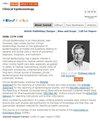Use of the CPRD Aurum Database: Insights Gained from New Data Quality Assessments
IF 3.4
2区 医学
Q1 PUBLIC, ENVIRONMENTAL & OCCUPATIONAL HEALTH
引用次数: 0
Abstract
Abstract: Ongoing evaluation of any electronic health data source is critical to assess suitability for its use in medical research. In addition, familiarity with a data source’s history and recording practices is important for making informed data source selection, study design choices, and interpretation of results. In this commentary, the authors discuss three studies that assessed different aspects of the quality and completeness of information contained in Clinical Practice Research Datalink (CPRD) Aurum compared to the well-established CPRD GOLD and to other linked data sources, with the aim to describe insights gained through these data quality assessments. Our findings support the view that CPRD Aurum and GOLD are both valuable tools for studies based on information recorded in primary care but should not be used without critical consideration of strengths and limitations. Further, use of linked data should be considered for some studies, after taking into account all relevant factors.Keywords: clinical practice research datalink, CPRD Aurum, CPRD GOLD, validation, data quality
CPRD Aurum 数据库的使用:从新数据质量评估中获得的启示
摘要:对任何电子健康数据源进行持续评估对于评估其是否适合用于医学研究至关重要。此外,熟悉数据源的历史和记录方法对于做出明智的数据源选择、研究设计选择和结果解释也很重要。在这篇评论中,作者讨论了三项研究,这三项研究评估了临床实践研究数据链(CPRD)Aurum 与成熟的 CPRD GOLD 及其他链接数据源相比所包含信息的质量和完整性的不同方面,旨在描述通过这些数据质量评估所获得的见解。我们的研究结果支持这样一种观点,即 CPRD Aurum 和 GOLD 都是基于初级医疗记录信息进行研究的重要工具,但在使用时应认真考虑其优势和局限性。此外,在考虑所有相关因素后,某些研究应考虑使用链接数据。 关键词:临床实践研究数据链;CPRD Aurum;CPRD GOLD;验证;数据质量
本文章由计算机程序翻译,如有差异,请以英文原文为准。
求助全文
约1分钟内获得全文
求助全文
来源期刊

Clinical Epidemiology
Medicine-Epidemiology
CiteScore
6.30
自引率
5.10%
发文量
169
审稿时长
16 weeks
期刊介绍:
Clinical Epidemiology is an international, peer reviewed, open access journal. Clinical Epidemiology focuses on the application of epidemiological principles and questions relating to patients and clinical care in terms of prevention, diagnosis, prognosis, and treatment.
Clinical Epidemiology welcomes papers covering these topics in form of original research and systematic reviews.
Clinical Epidemiology has a special interest in international electronic medical patient records and other routine health care data, especially as applied to safety of medical interventions, clinical utility of diagnostic procedures, understanding short- and long-term clinical course of diseases, clinical epidemiological and biostatistical methods, and systematic reviews.
When considering submission of a paper utilizing publicly-available data, authors should ensure that such studies add significantly to the body of knowledge and that they use appropriate validated methods for identifying health outcomes.
The journal has launched special series describing existing data sources for clinical epidemiology, international health care systems and validation studies of algorithms based on databases and registries.
 求助内容:
求助内容: 应助结果提醒方式:
应助结果提醒方式:


